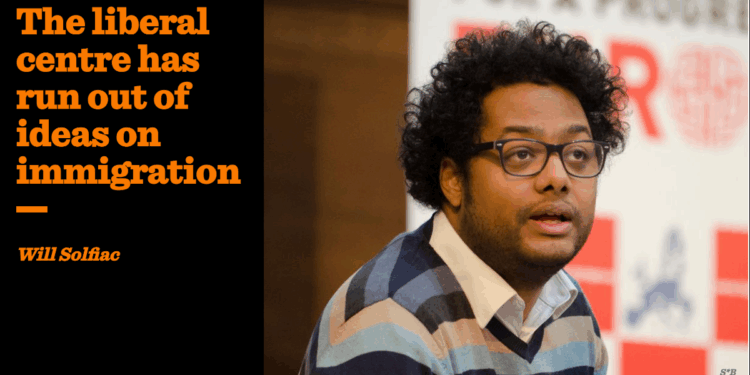Last week, Stephen Bush of the Financial Times published “The truth about immigration”. The article is paywalled but you can see some sections in the tweets I posted about it. As a guide to the truth it’s seriously lacking; it simply accepts the status quo and is full of lazy arguments and non-sequiturs, but what it aptly demonstrates is that the liberal centre has run out of ideas on immigration. I wanted to go through its points in detail.
Bush begins with an uncontroversial observation: almost every rich country has an ageing population and is having fewer children, which makes it more difficult to finance the expectations people have of public services given current levels of tax. He then says that states have “filled the gap” with immigration. It’s certainly true that the ageing population and increasing levels of immigration have occurred over the same time period, but an immigration policy that was primarily focused on maintaining the fiscal health of the country would look very different from that of most Western nations.
Such a policy would not allow in large numbers of low-skilled workers and their dependants, who soon become eligible to make full use of the welfare system, as the Boriswave in particular has enabled. It would not maintain an asylum system costing billions in hotel and legal fees. It would not allocate half of all council housing in one of the world’s most expensive and productive cities to recent immigrants, many of whom are not even in employment. More broadly, it would not simply continue the pyramid scheme of mass immigration at all because it would recognise that that would produce an even greater fiscal crisis in the future. It thus stretches credibility to say that immigration is about filling the gaps.
At this point in the article, you come to realise that it is illustrated with photos of people granted asylum from outside of Europe to Denmark, “challenging ideas of belonging and foreignness”. This is an interesting choice considering the famous graph showing that immigrants from non-Western countries are a net drain on the Danish public finances.
Bush then begins his examples of the truth about immigration with universities:
In the UK, overseas students have allowed universities to stay open even as domestic fees have been subjected to a long period of sharp, real-terms cuts.
The discourse around universities is strangely unlike that around anything else. It is often said, as Bush does, that overseas students allow universities to stay open. But is this a good thing? As John Burn-Murdoch, who contributed data to the article under discussion, noted in 2023, the UK graduate wage premium has been steadily falling for 25 years. In 2022 it was down to around 38 per cent, and this is for all graduates, including those who graduate from top universities and then go on to highly paid roles in finance, law and technology etc. How financially valuable is a university education for the bottom tier of universities, considering the vast debts that graduates now end up with? If you look at the graduate outcomes provider level data, (dashboard, full data), the median earnings 5 years after graduation in 2022/23 was £31,800, which was only marginally higher than the median full time earnings for all UK employees aged 21-29 (£29,120). And there are many, low- ranking universities in the list where the median earnings is thousands of pounds lower than the overall median. Considering these low rankings, it seems unlikely that these graduates are going to significantly increase their earnings as they age. Considering the questionable value of many of these low ranking university degrees, then, is it right that they should be funded by essentially selling UK visas?
Onto the labour market: Bush writes that “[i]mmigration has filled vacancies in the country’s care and construction sectors”. I previously wrote about the massive expansion of immigrant labour in Britain’s care industry after 2020. This was far too drastic to have been merely a response to labour shortages, and was more about employers, and immigrant workers themselves, taking advantage of much laxer rules than had existed before. Originally, only 6,000 of these visas were expected to be granted annually, but the numbers reached 349,000 by 2023.
Bush then goes onto the well-worn idea that opposition to immigration is just about discomfort with change. He writes:
London is an excellent example — opposition to immigration was much higher in the 1950s, 1960s and 1970s, when the capital had far less of it than it does today. But now, few Londoners expect anything else than to live in a diverse, multiracial city and so changes in the scale of immigration are much less politically controversial than they were before.
Most working-class white British Londoners abandoned the city in the late 20th and early 21st century
This is possibly the most egregious claim in the whole article. Most working-class white British Londoners abandoned the city in the late 20th and early 21st century — in large part due to a feeling of alienation from the mass immigration into it. Most people living in London today are recent immigrants or their descendants, so it is hardly surprising that they expect to live in a diverse, multiracial city. Londoners, by and large, have not changed their minds. They have changed their locations.
Bush goes on to talk about how immigration has waxed and waned over time, using the example of his grandparents. Past immigration is often used in this way, to equate it to current immigration and make the latter seem normal. But Bush’s grandparents were part of about 150,000 Jewish immigrants who came from the late 19th to the early 20th century, into a Britain of around 40 million. They therefore represented about 0.4 per cent of the population, a proportion they maintain today. By contrast Britain since 1997 has seen hundreds of thousands of immigrants every year, with the population of post-1950s immigrants and their descendants now approaching 30 per cent of the total population and 40 per cent of the school-aged population.
Bush then goes on to some international comparisons, starting with Japan.
For decades, Japan has had much lower rates of immigration than other rich countries, something made possible because its pensioners have lower incomes than their peers.
Japan’s pensioners don’t technically have lower incomes than their peers. The OECD’s latest data from 2020 shows that Japan’s over-65s receive 85 per cent of the average income of the total population, compared to 86 per cent in Britain, 84 per cent in Finland, and 82 per cent in Denmark. What is true is that a greater proportion of their income comes from paid work than in most other rich countries: the elderly in Japan (and South Korea) have notably higher workforce participation rates than in comparable countries. However as the linked OECD data shows, government transfers in Japan still make up a larger proportion of its recipients incomes than the state pension does in Britain (around 50 per cent vs around 40 per cent). Low pensions don’t therefore seem likely to be a significant reason why Japan has had significantly less immigration over the last few decades than Western countries — its different ideological approach is likely to be more relevant. Despite increasing levels of immigration in recent years, it is still very far from the situation of Western Europe; it accepts very few asylum seekers, and the majority of immigrants come from east or south east Asia. Economic explanations for differences like these can often sound more intelligent, when if you look at the actions of decision-makers, it’s more about ideology.
Bush then moves to Denmark, noting that it is often seen as a model for “how to do it” for centre-left parties (I wrote about this myself last year). Yet Bush thinks that the Denmark option is not a model for most countries. One piece of evidence given for this is that Denmark is not a “frontier state” and it is easier for it to shut its doors, but by this logic no northern European country is a “frontier state” (Britain is apparently a frontier state because it’s on the borders of the EU). He also writes that Labour are more vulnerable to bleeding support to their left than the Danish Social Democrats were when they tackled immigration, but considering that Starmer currently is, in his own awkward and self-defeating way, trying to tackle immigration and already bleeding support to the left, he might as well do it properly.
Bush then addresses the centre-right, first saying that it was Australia’s unique geographical and geopolitical situation that enabled it to stop the boats, but then admitting that some European countries are now doing this too via outsourcing it to Libya and Turkey. He cites the Italian model of keeping numbers high while limiting paths to citizenship and to family reunion as not being one Labour could persuade voters to swallow due to how untrusted they currently are on immigration. But it’s hardly as if Labour could become much less trusted than they already are.
Then we have a common trope emanating from the left — a graph showing that people believe that immigration is far more important as an issue facing the country as a whole than it is to them personally, with the implication that their concerns are therefore illegitimate. It’s completely core to left-wing ideology to care about broad issues that do not affect people’s day to day lives: climate change, or Palestine for example. Yet when people care about what immigration is doing to their country in a broad sense, this is said to be the result of some sort of media manipulation distracting them from their true interests.
Bush finishes his global immigration tour by asking us to consider the Dubai model of large numbers of single male migrants who are not expected to integrate into the national culture. Isn’t this exactly what people don’t want, he asks?
But it also means more areas where the immigrant population consists of solitary men, who are either single or miles from their families, neither of which local residents want, and is, again, bad for integration. Has Dubai, which has much higher numbers of immigrants but essentially no permanent path to citizenship, really done a better job of integrating people and preserving its identity than the UK has?
This is missing the point. Dubai’s single male migrants are not housed at taxpayer expense, and it’s hard to imagine cases of them being put into situations where they are able to sexually assault local girls, as happened in Epping, kicking off the recent protests. On the question of preservation of identity, it’s hardly as if the British model can be marked as success. Our policy of allowing in tens of millions of migrants over the last few decades, while pretending that there is no difference between them and natives, has led to a narrowing into meaninglessness of officially allowed expressions of British identity. We are now supposed to believe that it’s made up merely of the ideals of postwar global liberalism, i.e. the famous five fingers of British values, and to welcome the retconning of our history to pretend that the country was always multiracial.
Bush ends with an exhortation for governments to be clear-eyed about the tradeoffs in immigration policy — he seems to simply accept that the way we currently do things is the only way, we just need to be more honest about it. But there are lots of ideas for how to, if not solve all our problems, at least improve things. Some of these are currently being floated by Reform, below are a few more.
I believe we are currently in the early stages of a respectability cascade towards a new consensus
We could start by considering the Danish model: contra Bush, there are many aspects that could be implemented here. Or if that sort of consensus is impossible to achieve in Britain, then go harder. Abolish the asylum system as it currently stands and scrap the entire human rights regime that prevents deportations working as they should. Even The Economist now recognises that this is necessary. Pressure countries to accept deportations via removal of aid and the threat of restricting visas. Commission a detailed analysis of how “family reunification” really works — it should become clear from the analysis whether an immigrant group is using this route to facilitate chain migration. If it is, tighten restrictions from that country. Restrict post-study visas to high ranking universities to ensure that they are selling an education, not a visa. Change the Indefinite Leave to Remain rules to introduce five-year visas for low skilled workers that do not have a path to citizenship. If someone wants to come to Britain and work as a care worker for five years, save up some money, then return home, then fine. But allowing this to permanently change the demographics of the country is an antiquated idea and has to go.
Public opinion is shifting fast; I believe we are currently in the early stages of a respectability cascade towards a new consensus that the immigration policies of the last few decades have been a disaster. Those who consider themselves sensible truth tellers on immigration, like Bush, have no answer to the unprecedented situation we find ourselves in. They have run out of ideas — and excuses.












